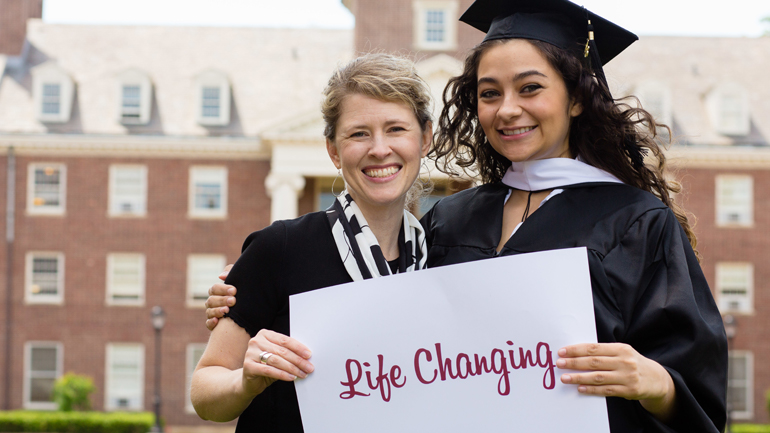The Literary Wonder
By Amy Downey
Devon Epiphany Clifton ’16 grew up in a small town in the Lehigh Valley where she recalls not knowing any other black families as a kid. She also remembers, at times, hearing horrible anti-black sentiments from people she knew, because they didn’t necessarily know—by her lighter complexion—that she was of color.

Thanks to mentorship from English professor Carrie Rohman, Devon Clifton ’16 (pictured at Commencement in 2016) was set on a successful path in literary studies. Clifton earned a master’s degree in English from New York University in 2018 and is currently working on her dissertation as part of Brown’s English doctoral program.
“I always thought that, ‘Woah, something painful is going on here,’” says Clifton. “And I realized early on that there are these things, these words, that impact so many people.”
After graduating from Nazareth Area High School, Clifton decided to stay close to home and study both English and women’s and gender studies at Lafayette. She then went on to earn a master’s degree in English from New York University in 2018; she’s currently working on her dissertation as part of Brown’s English doctoral program.
“I had never met anyone who had a Ph.D. until I went to undergrad,” she says. “Growing up, I was so not privileged in that way to even consider graduate school as an option for my future.”
Clifton credits English Professor Carrie Rohman as her biggest influence in the pursuit of a career in literary studies.
“I took a literary theory class with her that changed the way I thought about writing and what people could write and what writing could do,” says Clifton.
Rohman was equally inspired by the young scholar—especially when she oversaw Clifton’s honors thesis that dissected Nightwood by Djuna Barnes, one of the most difficult novels of its time period. (“Most professional scholars don’t even write about it,” explains Rohman.) But, for Clifton, the idea of tackling something so complex was rather simple.
“I wanted to read it and think about it and talk about it,” she says. “I thought there was an extra impulse in the novel to consider different ways to be in the world.”
Considering different ways to be in the world is part of her research right now at Brown, where she is focusing on black female subjectivity and black theory.
“There’s a way that blackness is represented as something that is continually needing to be endured, dying, or pathological. And that’s started to dominate the way that black literature is interpreted,” says Clifton, adding that the same perception can be found in film and other forms of media.
She’s particularly drawn to novels that show people who are black, female, and thriving—and how that messaging can impact the idea of identity.
“I do believe that books change people’s lives,” says Clifton, adding that she’d like to eventually write something that’s given academic consideration, but also consumed by, say, friends or family. More specifically, she’d like to blend creative nonfiction with traditional academic theory.
“I’m interested in ways that we can see black subjects as subjects, characters, and the default in the same ways we see whites as the default,” she says.
Once she completes her doctorate degree—she’ll take her qualifying exam next fall—her goal is to be in academia, writing and teaching.
Says Clifton, “Whether it’s a way to make the world a better place, enact social justice, or intervene in systems that are flawed fundamentally—that’s my motivation.”